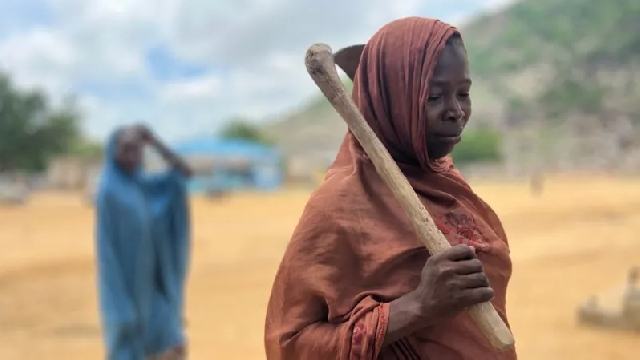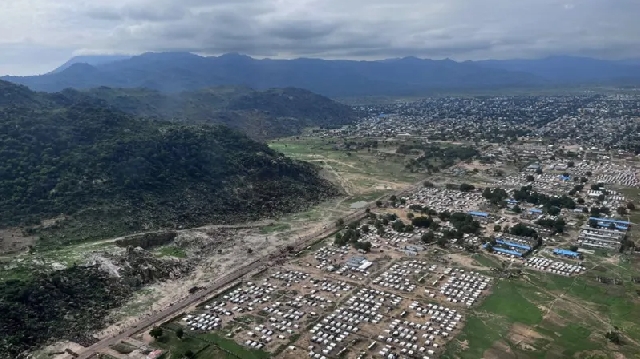Aid cuts will push Nigerians into arms of Boko Haram militants, UN warns
 Ayo Bello / BBC (Pic): Many of those who have sought refuge in Gwoza are farmers who are unable to tend the lush land in Borno state because of the insecurity
Ayo Bello / BBC (Pic): Many of those who have sought refuge in Gwoza are farmers who are unable to tend the lush land in Borno state because of the insecurity
Drastic cuts to humanitarian aid in north-eastern Nigeria could prove a boon to one of the world's most deadly militant groups, Boko Haram, aid agencies have warned.
A reduction of funding in recent months has forced the UN's World Food Programme (WFP) to ration its support, and now it has completely run out.
"It will be much easier for militants to lure youths to join them and spiral insecurity across the whole region," Trust Mlambo, head of operations in the area for WFP, told the BBC.
Notorious around the world for kidnapping more than 200 schoolgirls from the town of Chibok more than a decade ago, Boko Haram has taken thousands of people captive during its raids and forced more than a million from their village homes.
Boko Haram was initially a religious Muslim group founded in the early 2000s that was opposed to Western education. It went on to launch military operations in 2009 with the political aim of creating an Islamic state, causing mayhem across the region - including in neighbouring countries such as Cameroon, Chad and Niger.
It has been classified as one of the world's deadliest jihadist groups, and a splinter group pledged allegiance to the Islamic State group in 2015.
Aisha Abubakar has lost more than half her family because of attacks on her village in Borno state and illness.
"My husband and six children were killed in the bush," the 40-year-old told the BBC.
Four of her children survived, including one recently rescued from captivity after being kidnapped by the insurgents.
She fled to Gwoza, a garrison town to the west of Maiduguri, the capital of Borno state.
Gwoza is set at the foot of a stretch of breathtaking rocky hills. But beyond the hills, camped out in dense forested areas lies the danger the town's tens of thousands of camp residents fear - Boko Haram.
"I could never go back to the village," said Ms Abubakar. "Life in the village was unbearable, we were always on the run."
She has been trying to rebuild her life. She has found a new husband at Gwoza's camp for internally displaced persons and together they have a seven-month-old baby.
 | Anne Soy / BBC (Pic): Boko Haram militants live in the forested areas beyond the hills that surround Gwoza
| Anne Soy / BBC (Pic): Boko Haram militants live in the forested areas beyond the hills that surround Gwoza
Ms Abubakar is among close to 1.4 million displaced people in north-east Nigeria who are fully dependent on humanitarian aid for survival.
She spoke to the BBC after bringing her youngest child to the aid distribution centre at Gwoza. She rocked the baby while waiting for her turn at the registration centre, holding her blue debit card.
The support for the month is credited onto the card and the amount depends on the holder's family size. Ms Abubukar received $20 (£15) - and with it, she bought a sack of maize and other food items.
She said she was grateful, but that it was not enough to sustain her family for a month.
"We don't have any more to give after this [month's] cycle," said Mr Mlambo of the WFP.
"Our warehouses are empty, and we just are desperate for any generous donations."
The US State Department acknowledged its recent reorganisation of humanitarian assistance programmes had resulted in some cuts, in line with President Donald Trump's America First policy.
"The United States continues to be the most generous nation in the world, and we urge other nations to increase their humanitarian efforts," a senior State Department official told the BBC.
It has said previously that 80% of the US government's support to the WFP has not been affected.
On the ground in Nigeria, the lower support from all donors to the WFP this year has already resulted in a spike in malnutrition rates.
Médecins Sans Frontières (MSF) said the number of children with the most severe and deadly form of malnutrition more than doubled in the first half of the year.
"Six-hundred-and-fifty-two children have already died in our facilities since the beginning of 2025 due to lack of timely access to care," the medical charity said.
The true scale of the crisis exceeds all expectations, MSF's country representative for Nigeria Ahmed Aldikhari said in a statement.
He added that 2024 had "marked a turning point in northern Nigeria's nutritional crisis", as major donors including the US, UK and the European Union had scaled down or halted their support altogether.
Nigeria is one of Africa's largest economies and its most populous nation but has long been beset by rampant corruption.
It has also undergone massive inflation and currency devaluation in recent years and failed to bring under control the insurgency in the north-east of the country.
However, its leadership has lately publicly recognised the malnutrition challenge the government faces.
Two weeks ago, Vice-President Kashim Shettima said malnutrition had deprived "40% of Nigerian children under five their full physical and cognitive potential", and promised to tackle it.
The statement followed the inauguration, last month, of a nutrition board, which he described as a "war room to battle against malnutrition in every corner of the country".
But beyond the rallying call, the question is how fast and how far it can act to halt and reverse the staggering levels of undernutrition amid the sweeping and sudden cuts to funding much of the region relied on for years.
More than 150 donor-funded clinics that have been treating malnutrition in the north-east of the country are also facing imminent closure.
Back in Gwoza, a mother of two feels defeated after learning her first child, Amina, is now malnourished despite her best efforts to provide healthy food.
"I feel bad, because every mother wants her baby to be healthy," 25-year-old Hauwa Badamasi told the BBC.
She said she had been unable to go to her family's farm near her home village for years because of insecurity.
"The aid has stopped and people are killed on the farm. What are we going to do with our lives?" she asked as three-year-old Amina ate the nutritional supplement she had just been given at the Hausari B clinic.
It serves some 90,000 people, many of them farmers - like Ms Badamasi - displaced by the insurgency.
"We will be in a dire situation with no food and no medicine," said Ms Badamasi. "Our survival depends on these essentials."
She was given a bag of the supplement - peanut paste - to continue treatment at home. It may well be the last, unless the funding situation changes.
The WFP's Mr Mlambo offered a bleak assessment of things to come, suggesting the lack of food could push desperate people back into the hands of the militants.
"If people here feel that their livelihood [is gone], they can't even have the next meal, for sure, they will be pushed to go just across the [hills] to enrol," said Mr Mlambo.
While those living in Gwoza feel protected by the military's presence there, they have little faith in the army's ability to end the insurgency - and fear for their future.
Source: bbc.com
Trending World

Wildfires rage in Greece and Turkey as extreme heat persists
09:58
China offers parents $1,500 in bid to boost births
12:16
Putin must agree Ukraine ceasefire in 10 or 12 days, says Trump
12:11
Nigeria kidnappers kill 35 hostages even after ransom paid
12:06
U.S. economy grew at a 3% rate in Q2, a better-than-expected pace even as Trump’s tariffs hit
14:51
YouTube to be included in Australia's teen social media ban
15:59
Angola's petrol protest death toll rises as medics overwhelmed
16:34
Tanzania's ban on foreigners operating small businesses sparks Kenyan backlash
16:28
Aid cuts will push Nigerians into arms of Boko Haram militants, UN warns
16:24
Kenya's sweeping alcohol control plan sparks anger
13:15




